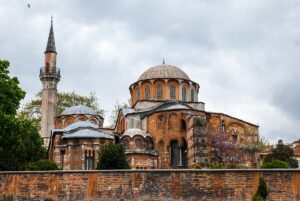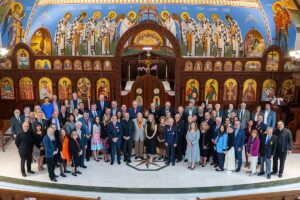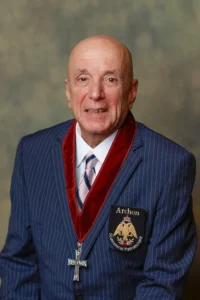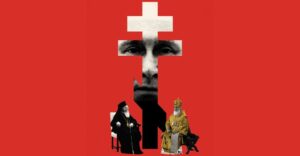A seminar on Religious Freedom, organized by the Ecumenical Patriarchate in collaboration with the Council of European Episcopal Conferences, was held in Istanbul, Turkey on May 17-18, 2013. Archon Constantine G. Caras represented the Order of Saint Andrew the Apostle and offered the following remarks:
Religious Freedom Today
1700 Years after Emperor Constantine’s Edict of Milan
Comments on behalf of The Order of St. Andrew the Apostle
A Seminar of the Ecumenical Patriarchate
Constantine G. Caras, Archon Skevophylax
May 17, 2013
It is a great honor for me to be present today, representing the Order of St. Andrew the Apostle and Commander Dr. Anthony J. Limberakis, and to participate in this important seminar commemorating the Edict of Milan, promulgated by the Emperor Constantine 1700 years ago. We thank His All Holiness for offering today’s program and the Council of European Episcopal Conferences of Europe and the Appeal of Conscience Foundation for their collaboration. It is a special honor for me to be here, alongside so many distinguished and learned speakers and guests, representing the Christian, Jewish and Muslim communities.
Each of the three monotheistic communities represented here faces throughout the world issues specific to itself. My remarks focus on issues threatening the survival of the Ecumenical Patriarchate and how the Archons of the Order of St. Andrew the Apostle are addressing these issues.
As you may know, the Archons of the Order of St. Andrew are committed to securing religious freedom and institutional human rights for the Ecumenical Patriarchate. To this end, the Archons have addressed important issues for many years in countless discussions and meetings with Turkish, U. S. and European government officials and with representatives of the European Union. The journey has been long and arduous. The goal is just.
As His All Holiness explained when meeting with members of the Turkish Parliament last year, “All we ask for is equality.”
The Turkish government has now taken bold and perhaps politically unpopular steps to begin to address some of these issues. The road to complete and unfettered religious freedom continues to be uphill, circuitous and challenging. Much still needs to be accomplished. However, the new policies of Prime Minister Erdogan have established a foundation upon which the pillars of religious freedom and the institutional human rights of the Ecumenical Patriarchate can be rebuilt.
Permit me to review five issues with you briefly
1. Property Confiscation
The Edict of Milan spelled out clear instructions calling for the government and the citizens of the Roman Empire to restore to the Christians all property that had been confiscated from them. These instructions applied to property previously belonging to individuals and to the churches.
In 1936, the Ecumenical Patriarchate possessed over 8,000 properties. Presently that number is down to about 150.
The Archons of the Order of St. Andrew can now report that there has been some progress in the return of properties that once belonged to the Ecumenical Patriarchate, although progress has been slow.
The Turkish government has complied in all respects with the 2008 Judgment of the Court of Human Rights, directing that the Patriarchal Orphanage located on Pringipos (Buyukada) Island should be returned to the Ecumenical Patriarchate. The Ecumenical Patriarchate has announced that the Orphanage will be transformed into a Global Center for Peace and the Environment. As you may know, Archons of the Order played an important support role in the preparation and presentation of arguments before the Court.
In addition, the Turkish government, in August 2011, issued a historic decree to return confiscated property to religious minority foundations and to compensate those foundations for properties that had been sold to third parties.
The decree currently applies to 167 minority foundations, of which approximately 67 are Greek Orthodox claiming about 1600 properties. The General Directorate slowly is going through the applications for the return of property, which is a time-consuming process. The properties must be accurately identified. Many properties are now owned by private individuals, which further complicates the process. The understanding is that such properties will not be returned, but compensation will be offered. At this time, approximately 450 applications have been reviewed, about half of which unfortunately have been rejected. The remainder are currently being considered.
A few Orthodox Foundations have regained valuable properties and are hopeful that others will soon follow. For example, this past January the Council of Foundations returned 190 hectares (470 acres) to the Agia Triada Monastery Foundation, which under Turkish law is the owner of the Halki School of Theology. This was the largest return of immovable property to a minority foundation within Turkey. Most of the property is forested land surrounding the School.
Another positive development was reported in the press yesterday. The General Directorate of Foundations is returning a building which the Greek community of Mesochori (Ortakoy) in the Istanbul District was using as a primary school until 1958 when it was confiscated by the municipality because it did not have enough students.
The Archons will continue to monitor the property application process and provide assistance as requested.
2. Closure of Halki School of Theology 42 Years Ago.
The Treaty of Milan directed that the Christians should be allowed to practice their religion unfettered. The Archons of the Order of St. Andrew believe that the reopening of the Halki School of Theology is critical to an unfettered Ecumenical Patriarchate.
The School was founded in 1844 by Patriarch Germanos IV on the site of a much older monastery on the island of Halki (Heybeliada) and functioned until 1971 when it stopped admitting new students because of a law banning private higher education institutions. Throughout the years, almost a thousand students have graduated from the institution, including most of the Ecumenical Patriarchs since the School’s founding, in addition to many other distinguished clerics and theologians.
For many years, the entreaties of the Ecumenical Patriarch and the Archons to allow the reopening of the School have been met with silence. but recently there have been public statements calling for the reopening of Halki by significant Turkish government leaders. The Archons of the Order remain vigilant and optimistic the Seminary will reopen.
The Archons consistently focus on this issue when meeting with government officials in the United States, Turkey and internationally. Consequently, In his April 2009 speech before the Turkish Parliament, President Obama reaffirmed the need for Turkey to allow the reopening of Halki. In January of this year, then Secretary of State Hillary Clinton wrote a letter to the Ecumenical Patriarch affirming support for the reopening of Halki and linking its continued existence to religious freedom and interethnic dialogue in Turkey and the Islamic world.
3. Election of the Ecumenical Patriarch
The Turkish government requires that the Ecumenical Patriarch must be a Turkish citizen, which requirement limits the number of candidates. In a positive development, Prime Minister Erdogan waived the five year residency requirement for Turkish citizenship, opening the path for hierarchs to apply for Turkish citizenship.
As of today, twenty six hierarchs from around the world have applied. Twenty one have been granted citizenship, but five were unfortunately rejected, which poses a serious impediment to the entire solution. No meaningful explanation for the rejection has been offered. In addition, another open issue remains. The 1970 Talimat grants Turkish authorities the right to arbitrarily remove from candidacy canonically eligible hierarchs.
As you may know, the Ecumenical Patriarch, the Armenian Patriarch and the Chief Rabbi in Turkey, following what is de facto required by an arcane set of laws, edicts and practice, are chosen subject to government permission. The Turkish government, as justification, relies on its interpretation of the 1923 Treaty of Lausanne, but the Archons believe that the proper interpretation and appropriate conduct is to allow these three religious minorities to elect their own leaders without any government interference.
4. Non-recognition of the Title Ecumenical
Prime Minister Erdogan has stated that use of the title “Ecumenical” should not be a matter on which the state should rule. However, the government continues to refer to the Ecumenical Patriarch as the “Greek Orthodox Patriarch,” ignoring 1,500 years of tradition.
5. Lack of Legal Personality
The Ecumenical Patriarchate is hampered in its ability to seek legal redress, or take other necessary action, on its own because under Turkish law it lacks a bona fide legal personality. In other words, the Ecumenical Patriarchate is not permitted to own property on its own or even to file for a permit to undertake major repairs to one of its churches. This is an impediment shared by all other minority institutions in Turkey, including the Armenian Patriarchate, the Jewish Chief Rabbi’s Office and various Catholic institutions. Mr. Laki Vingas, who is in charge of minority foundations in the General Directorate of Foundations, chairs a conference which is focusing on this subject. Mr. Vingas, explains that not only religious institutions, but also nursing homes, hospitals and even cemeteries lack legal entity rights. Mr. Vingas currently is attempting to bring together all the minority foundations to address this issue.
The Order of St. Andrew continues to pursue initiatives both in the United States and internationally that are designed to bring to the forefront the religious freedom concerns of the Ecumenical Patriarchate. I conclude my remarks by reviewing briefly five of these initiatives.
1. International Archon Religious Freedom Conferences
In December of this year, the Order will sponsor in Berlin, Germany its second International Religious Freedom Conference. The theme of the Conference will be “Tearing Down Walls.” As was the case with the first such Conference, which was held at the European Parliament in Brussels in 2010, the Conference will bring together scholars, religious freedom and human rights advocates, journalists, diplomats, parliamentarians, religious leaders, representatives of the Government of Turkey, lawyers and members of minority groups. In addition, the Conference will serve as an instrument to unite the Archons of America with the various religious minorities of Turkey including the Syriacs, Roman Catholics, Protestants, Jews and Alevi Muslims who share common concerns, as well as with the majority Sunni Muslims. If possible, I urge you to attend.
2. The Archon Washington Initiative
The Order maintains a full time presence in Washington, DC for the purpose of educating U. S. Government officials and the U. S. Congress on matters related to the protection of the Ecumenical Patriarchate.
The Archons have explained in detail the problems facing the Ecumenical Patriarch to every President, beginning with George Herbert Walker Bush. President Clinton, Vice President Biden, and Secretaries Clinton and Kerry have visited the Phanar. Presidents George Bush and Barack Obama also have met with His All Holiness. An overwhelming majority of the U. S. Senate and the U. S. House of Representatives have signed and sent to President Obama letters calling for full religious and human rights for the Ecumenical Patriarchate.
3. The Archon 50 State Religious Freedom Resolution Initiative
The Order has identified Archons, clergy and key Orthodox Christians in all 50 states who have participated in local campaigns to enact Religious Freedom Resolutions in support of religious freedom for the Ecumenical Patriarchate. To date, 51 such Resolutions have been adopted in 42 states representing 90% of U. S. citizens.
4. The Archon European Union Initiative
In cooperation with His Eminence Metropolitan Emmanuel of France, members of the Order frequently call upon officials of the European Union to discuss issues pertinent to the Ecumenical Patriarchate. Visits with the rotating EU Presidency are regularly scheduled in their home countries, so as to bring to the forefront religious freedom concerns not only for the Ecumenical Patriarchate, but also for all religious minorities of Turkey.
5. Visits with Turkish Government Officials
On every occasion possible when officers of the Order present themselves at the Ecumenical Patriarchate they also endeavor to meet with and conduct frank discussions with local and national Turkish Government officials. For example, last September an Archon delegation journeyed to Ankara where it conferred with Turkey’s Deputy Prime Minister, Bulent Aring and with Turkey’s top Muslim cleric, Professor Mehmet Gormez, President of Turkey’s Religious Affairs Directorate.
In September 2011, Archbishop Demetrios of America and an Archon delegation met with Prime Minister Erdogan during Mr. Erdogan’s visit to New York and discussed, in a very cordial but direct manner, all the relevant issues affecting the Ecumenical Patriarchate.
As others haven pointed out today, Emperor Constantine understood the state had nothing to fear from the Christians, and his empire actually grew more stable following the Edict of Milan. So too, the Archons always endeavor to assure Turkish government officials that they have nothing to fear from an unbridled Ecumenical Patriarchate. As His All Holiness has often asked, “Are we not also citizens of this country?”
Permit me to close with the following comments. It is tempting, yet difficult, to draw comparisons between conditions in the world today and those during the time of Constantine. What I can say is that today’s three great monotheistic religions are under attack. Statistics worldwide (as shown in the most recent WIN-Gallup and Pew Research polls) reveal that those who call themselves atheists, agnostics, or nonbelievers have increased significantly during the last 20 years, perhaps proportionally to the dramatic surge in technology. The percentage of believers, who regularly attend worship services, as shown throughout the world, is below 50 percent.
Emperor Constantine understood that an empire free of strife among its religious groups would result in a better way of life for its citizens. This reality is no less true today.
As Denis McDonough, Chief of Staff to President Obama, observed in a recent meeting with an Archon delegation, “history bears us out in demonstrating that a lack of religious freedom weakens social cohesion and alienates citizens from their government, fomenting internal unrest, breeding extremism, and inhibiting national unity and progress.
So too, the Archons of the Order of St. Andrew the Apostle believe that, throughout the world today, an environment of unbridled religious freedom and institutional human rights should be afforded by all nations, not just to the Ecumenical Patriarchate, but to each of the three monotheistic communities present here today.







